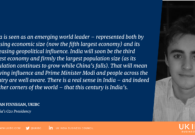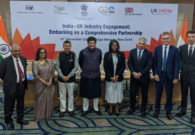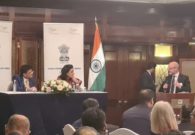UK-India FTA negotiations: Round three follows positive PM bilateral
After a positive visit of Prime Minister Boris Johnson to India last week, the third round of FTA negotiations between the UK and India has begun in New Delhi.
Over the next two weeks, negotiating teams representing the UK and Indian governments will cover a range of issues across goods and services. At the FTA launch in January, Minister Piyush Goyal and Secretary of State Anne Marie Trevelyan outlined the ambition to conclude a comprehensive FTA within 12 months. Last week, in India, Prime Minister Johnson outlined his hopes for a “deal by Diwali”. We at UKIBC are encouraged by the Prime Minister’s positivity – as Managing Director Kevin McCole wrote in The Print, political will is one of the key ingredients to a successful FTA – and it is welcome to see this pacey target sustained.
The two rounds so far have mostly been about the negotiating teams sharing their priorities, understanding the more challenging issues, and where quick wins can be achieved. The first round of negotiations took place virtually in January and were extensive – made up of 32 separate sessions covering 26 policy areas. These included important issues for trade and investment in both goods and services, such as IP and customs procedures, as well as digital and telecommunications. Round two saw draft treaty text shared and discussions across most chapters that will make up the agreement. Technical experts from both sides came together for discussions in 64 separate sessions covering the same 26 policy areas. I think round three is where we can start to see areas of agreement that will result in trade and investment barriers falling, and the contours of a deal starting to take shape, at least in some areas.
There are a few important areas I think we could see progress on in the next couple of rounds. I’ll highlight three key areas here:
Customs procedures: like the No Objection Certificate requirement that gives consignees of goods in India control over shipments and is unique to India. Simplification and clarity on procedures would enable seamless flow of trade and reduce unnecessary costs and complications for businesses in both directions of trade.
Tariffs: for example, on medical devices and the infamous 150 percent on Alcoholic Beverages. If reduced, these would enable Indian consumers to access more, quality products at better prices, and the same for Indian producers using British products in their own production processes.
Standards: such as in highly regulated areas like pharma and medical devices. Businesses would like to see the UK-India FTA lead to a greater use of international standards in India which promotes interoperability and creates simplified, and therefore greater, trade opportunities.
It is encouraging to see the recent Australia-India interim deal include some of these areas. In the case of Customs Procedures, both parties agreed to apply procedures and practices in a predictable, consistent, and transparent manner, and to facilitate trade, including through electronically provided standardised information related to imported and export goods through a single window.
In the pharmaceutical sectors, fast tracks for approval for both patented, generic, and biosimilar medicines and for quality assessment of manufacturing facilities will help to ease and therefore grow trade, benefitting businesses, as exporters and importers, and society as recipients of pharmaceutical products.
Drug regulators in both India and Australia will work together to facilitate trade in human prescription medicines and medical devices. Similar collaboration between India’s and the UK’s authorities would be positive.
India has also agreed to reduce the import duty on high-end Australian wines. We would like to see reductions too for tariffs on UK wines and spirits.
Such wins in a UK-India Agreement will open up many more opportunities to boost bilateral trade between our two countries. As well as growing exports, these wins would also help to build on the hundreds of thousands of jobs in both countries, and support investment. Indeed, Prime Minister Johnson expressed his support for the Make in India mission at his bilateral with Prime Minister Modi on Friday. And, as the UKIBC’s Socio-Economic Impact initiative seeks to highlight, UK businesses invested in India contribute to the country’s wider development beyond economic growth and jobs. See a selection of case studies on the programmes UK businesses are conducting to help to improve health, education, environmental sustainability, and more in India in our recently launched SEI casebook here.
The UKIBC has raised these and many more issues to both Governments on behalf of our members and clients throughout the FTA process. You can read a summary of our submission here.

 By Kealan Finnegan
By Kealan Finnegan 




